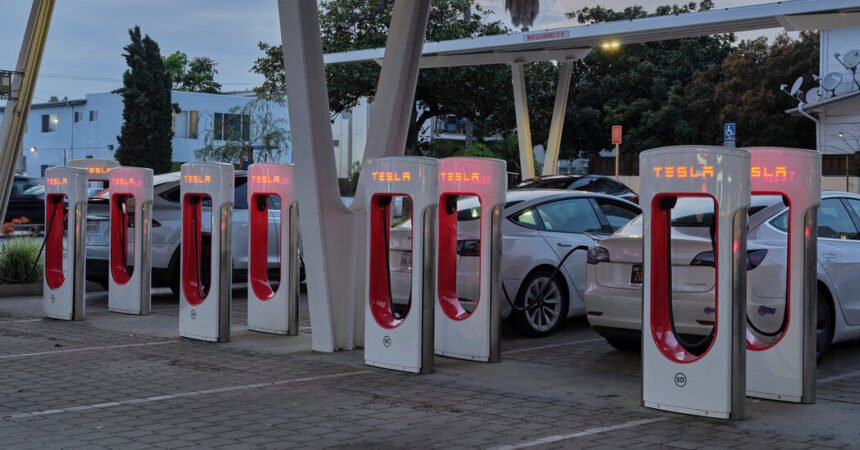Elon Musk has gutted the part of Tesla responsible for building electric vehicle charging stations, sowing uncertainty about the future of the largest and most reliable U.S. charging network.
The layoffs of several hundred Tesla employees, which many of them posted about on social media on Tuesday, raised questions about deals that Mr. Musk, Tesla’s chief executive, struck with the leaders of General Motors, Ford Motor and other automakers last year allowing cars made by other companies to use Tesla Supercharger stations.
Tesla’s agreements with other makers of electric cars assured buyers that they would be able to find fast chargers on road trips, addressing one of the main reasons that many people are hesitant to buy such cars. It was also seen as a coup for Mr. Musk, validating Tesla’s technology and giving the company outsize influence over the auto industry.
Almost all major manufacturers announced plans to switch the hardware and software in their cars to make them compatible with Tesla’s chargers. Ford has been mailing adapters to owners of its older electric vehicles so they can connect to Tesla’s chargers.
“Ford’s plans for our customers do not change,” Martin Günsberg, a Ford spokesman, said in an email.
The abrupt dismissal of the Supercharger team caught many people off guard, and suggested that Mr. Musk had changed his mind about the company’s strategy in ways that were not yet clear to outsiders.
Andrés Pinter, whose company installs chargers for Tesla, said he was stunned Tuesday morning to learn about the layoffs, which included about 20 people he had been in touch with on construction projects. He said emails to those Tesla employees had bounced back with an automated message saying those addresses were no longer valid.
“I see this as a shocking reversal from going all-in on the Supercharger network,” said Mr. Pinter, who is co-chief executive of Bullet EV Charging Solutions, which is based in Austin, Texas, where Tesla is also based. Until Tuesday, Mr. Pinter said, Tesla had been pushing Bullet to expand into other states and move as fast possible.
Tesla did not reply to a request for comment.
Numerous laid-off Tesla employees discussed the job cuts publicly. Mr. Musk “has let our entire charging org go,” William Navarro Jameson, a senior manager at Tesla’s charging operation, said on X. “What this means for the charging network, NACS, and all the exciting work we were doing across the industry, I don’t yet know.”
NACS, or the North American Charging Standard, was developed by Tesla and has a reputation for being a reliable and easy-to-use charging technology.
The latest layoffs, two weeks after Tesla said it was firing 14,000 people worldwide, unsettled investors who had been regaining confidence in the company after it reported last week a 55 percent drop in its first quarter profit.
Tesla shares were down about 5 percent on Tuesday afternoon, though they are still up around 13 percent since Thursday. Mr. Musk has said in recent weeks that, despite a decline in car sales, Tesla still has enormous growth potential from products based on artificial intelligence and autonomous driving technology.
The charging network is regarded as a key element in Tesla’s dominant position in the electric vehicle market. There were hardly any fast chargers when the company began selling the Model S, its first sedan, in 2012. Tesla built its own network of more than 2,600 fast chargers in the United States. They are often the only chargers in many regions.
“You made E.V. adoption possible,” George Bahadue, another senior manager at the charging unit, said on LinkedIn in a message to other team members who had also lost their jobs.
By allowing other manufacturers to use the network, Tesla opened up a potentially lucrative source of recurring revenue. But Mr. Musk also took away the exclusive access to the network, which was one of the perks of owning Tesla’s cars.
The automaker has been a major beneficiary of federal funds to build charging networks, and is unlikely to stop building chargers entirely. As other carmakers like Hyundai and Ford have chipped away at Tesla’s market share, Mr. Musk may have concluded that it was not in Tesla’s interest to build many more chargers, which would help its rivals sell cars.
Some employees expressed bitterness after the layoffs, raising the risk that the abrupt dismissals could undercut morale among those still at the company.
“If you would have told me a month ago that Tesla was a company that would notify people, some with 10-plus years of experience, who helped build the company to what it is today with nothing more than a ‘Dear Employee’ email in middle of the night,” Lane Chaplin, a former employee of the charging unit, wrote on LinkedIn, “I would have said you’re nuts.”
Ryan Mac contributed reporting.

